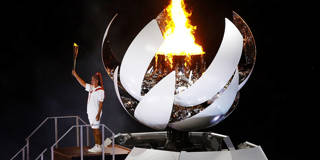Every two years, critics complain that the Olympic Games elicit chauvinistic attitudes, allowing superpowers to flex their muscles in zero-sum competition with one another. But the Games also inspire healthier responses, particularly among smaller, newer, and poorer countries.
CHICAGO – In addition to being postponed by a year, the 2020 Tokyo Olympic Games have been steeped in controversy. According to one recent survey, 78% of Japanese citizens thought the Games should be canceled, owing to concerns about the pandemic. Since then, Japanese media have been shining a spotlight on the fact that not all visiting athletes (including 100 from the United States) are vaccinated against COVID-19.
On top of these unprecedented public-health concerns are the perennial political issues, such as the common complaint that the Olympics encourage nationalism or chauvinism. Every event produces a showdown over anticipated medal counts between big contenders like the US, China, Japan, Great Britain, and Russia (which is participating in the Tokyo Games as the “Russian Olympic Committee,” following the country’s ban for doping).
Political regimes around the world recognize that sports can strengthen national identity, and that the Olympics, in particular, can confer status on the world stage. Governments have long used the Games to tell their citizens, “We have made it.” In 1936, Hitler took full advantage of the Olympics in Berlin, which had been chosen to host the Games in 1931, two years before the National Socialists came to power. In 1964, the Japanese used the Tokyo Olympics to signal their full rehabilitation after World War II. And in the 1980s, the Olympics became a Cold War football, with the US boycotting the Moscow Games in 1980 and the Soviets boycotting the Los Angeles Games in 1984.

CHICAGO – In addition to being postponed by a year, the 2020 Tokyo Olympic Games have been steeped in controversy. According to one recent survey, 78% of Japanese citizens thought the Games should be canceled, owing to concerns about the pandemic. Since then, Japanese media have been shining a spotlight on the fact that not all visiting athletes (including 100 from the United States) are vaccinated against COVID-19.
On top of these unprecedented public-health concerns are the perennial political issues, such as the common complaint that the Olympics encourage nationalism or chauvinism. Every event produces a showdown over anticipated medal counts between big contenders like the US, China, Japan, Great Britain, and Russia (which is participating in the Tokyo Games as the “Russian Olympic Committee,” following the country’s ban for doping).
Political regimes around the world recognize that sports can strengthen national identity, and that the Olympics, in particular, can confer status on the world stage. Governments have long used the Games to tell their citizens, “We have made it.” In 1936, Hitler took full advantage of the Olympics in Berlin, which had been chosen to host the Games in 1931, two years before the National Socialists came to power. In 1964, the Japanese used the Tokyo Olympics to signal their full rehabilitation after World War II. And in the 1980s, the Olympics became a Cold War football, with the US boycotting the Moscow Games in 1980 and the Soviets boycotting the Los Angeles Games in 1984.